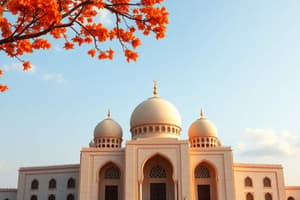Podcast
Questions and Answers
What is the term for the Islamic concept of the oneness of God?
What is the term for the Islamic concept of the oneness of God?
- Shahada
- Salat
- Tawhid (correct)
- Zakat
Which of the following is NOT considered a holy book in Islam?
Which of the following is NOT considered a holy book in Islam?
- Bhagavad Gita (correct)
- Quran
- Gospel
- Torah
What is the declaration of faith in Islam called?
What is the declaration of faith in Islam called?
- Sawm
- Zakat
- Shahada (correct)
- Salat
During which month do Muslims fast?
During which month do Muslims fast?
What is the term for pilgrimage to Mecca?
What is the term for pilgrimage to Mecca?
Which of these is the holy book of Islam?
Which of these is the holy book of Islam?
What are the teachings, practices, and sayings of Prophet Muhammad known as?
What are the teachings, practices, and sayings of Prophet Muhammad known as?
What is the obligatory charity in Islam called?
What is the obligatory charity in Islam called?
How many times a day do Muslims perform Salat (ritual prayers)?
How many times a day do Muslims perform Salat (ritual prayers)?
Which city was the first Muslim community established in?
Which city was the first Muslim community established in?
Flashcards
Tawhid
Tawhid
Absolute belief in one God (Allah), who is unique, all-powerful, and the creator.
Salat
Salat
Performing ritual prayers five times a day facing the Kaaba in Mecca.
Zakat
Zakat
Giving obligatory charity to the poor and needy.
Sawm
Sawm
Signup and view all the flashcards
Hajj
Hajj
Signup and view all the flashcards
The Quran
The Quran
Signup and view all the flashcards
The Sunnah
The Sunnah
Signup and view all the flashcards
Islamic Law (Sharia)
Islamic Law (Sharia)
Signup and view all the flashcards
Islamic Ethics
Islamic Ethics
Signup and view all the flashcards
Muhammad (peace be upon him)
Muhammad (peace be upon him)
Signup and view all the flashcards
Study Notes
- Islamiat, also known as Islamic Studies, is a field of study that deals with the religion of Islam.
- It covers various aspects of Islam, including its history, beliefs, practices, and culture.
Core Elements of Islam
- Tawhid (Oneness of God): The absolute belief in one God (Allah), who is unique, all-powerful, and the creator of everything.
- Prophethood: Belief in prophets sent by God throughout history to guide humanity, with Muhammad (peace be upon him) being the final prophet.
- Holy Books: Acceptance of divine scriptures, including the Quran (the final and complete revelation), Torah, Psalms, and Gospel.
- Angels: Belief in angels as messengers of God.
- Day of Judgment: Belief in an afterlife where individuals will be judged for their actions in this life.
Pillars of Islam
- Shahada: Declaration of faith: "There is no god but Allah, and Muhammad is his messenger."
- Salat: Performing ritual prayers five times a day facing the Kaaba in Mecca.
- Zakat: Giving obligatory charity to the poor and needy.
- Sawm: Fasting during the month of Ramadan from dawn till sunset.
- Hajj: Performing pilgrimage to Mecca, if physically and financially able.
The Quran
- The holy book of Islam, believed by Muslims to be the direct word of God as revealed to Prophet Muhammad.
- Divided into 114 chapters (Surahs) and verses (Ayats).
- Serves as the primary source of Islamic guidance and law.
The Sunnah
- Refers to the teachings, practices, and sayings of Prophet Muhammad (peace be upon him).
- Complements the Quran and provides practical examples for Muslims to follow.
- Collected in Hadith books, which are narrations about the Prophet's life and teachings.
Islamic Law (Sharia)
- A comprehensive legal system derived from the Quran, Sunnah, and other sources of Islamic jurisprudence.
- Covers various aspects of life, including personal conduct, family matters, economic transactions, and criminal justice.
- Different schools of thought (madhabs) exist within Islamic jurisprudence, each with its own interpretations and methodologies.
Islamic History
- Begins with the birth of Prophet Muhammad (peace be upon him) in Mecca.
- Includes the establishment of the first Muslim community in Medina.
- Covers the period of rapid expansion of Islam across Arabia, North Africa, and other regions.
- Encompasses various Islamic empires and dynasties, such as the Umayyad, Abbasid, and Ottoman empires.
Islamic Ethics
- Emphasizes moral values such as honesty, justice, compassion, and forgiveness.
- Encourages good relations with family, neighbors, and the wider community.
- Forbids harmful practices such as lying, cheating, stealing, and murder.
Islamic Culture
- Encompasses various aspects of Muslim societies, including art, architecture, music, literature, and cuisine.
- Influenced by Islamic values and principles.
- Exhibits diversity across different regions and historical periods.
Islamic Philosophy
- Deals with philosophical questions from an Islamic perspective.
- Explores topics such as the nature of God, the purpose of life, and the relationship between reason and revelation.
- Prominent Islamic philosophers include Al-Kindi, Al-Farabi, Ibn Sina (Avicenna), and Ibn Rushd (Averroes).
Islamic Art
- Characterized by geometric patterns, calligraphy, and arabesque designs.
- Avoids portraying human figures, especially God or Prophet Muhammad.
- Found in mosques, palaces, and other Islamic structures.
Islamic Architecture
- Includes mosques, palaces, tombs, and other structures.
- Features elements such as domes, minarets, arches, and courtyards.
- Influenced by local architectural traditions and Islamic aesthetics.
Islamic Spirituality (Sufism)
- Focuses on the inner dimensions of Islam and the pursuit of spiritual purification.
- Emphasizes love, devotion, and direct experience of God.
- Involves practices such as meditation, prayer, and remembrance of God (dhikr).
Key Figures in Islam
- Muhammad (peace be upon him): The final prophet of Islam, who received the Quran and established the Muslim community.
- Abu Bakr: The first caliph of Islam and a close companion of the Prophet.
- Umar ibn al-Khattab: The second caliph of Islam, known for his justice and administrative skills.
- Uthman ibn Affan: The third caliph of Islam, who oversaw the compilation of the Quran.
- Ali ibn Abi Talib: The fourth caliph of Islam and a cousin and son-in-law of the Prophet.
Islamic Schools of Thought
- Sunni Islam: The largest branch of Islam, which emphasizes the importance of the Quran and Sunnah.
- Shia Islam: The second-largest branch of Islam, which believes that Ali ibn Abi Talib was the rightful successor to Prophet Muhammad.
- Other schools of thought include Ibadi Islam and various Sufi orders.
Contemporary Issues in Islam
- Modernity and Islam: The challenges and opportunities faced by Muslims in the modern world.
- Islamic extremism: The rise of extremist groups that use violence in the name of Islam.
- Interfaith dialogue: Efforts to promote understanding and cooperation between Muslims and people of other faiths.
- Women in Islam: The role and status of women in Islamic societies.
- Islam and democracy: The compatibility of Islamic values and democratic principles.
Islamic Economics
- Based on Islamic principles, such as prohibition of interest (riba), promotion of social justice, and ethical business practices.
- Includes concepts such as Zakat (charity), Waqf (endowment), and Islamic banking.
- Aims to create a more equitable and sustainable economic system.
Importance of Studying Islamiat
- Understanding the beliefs, practices, and values of Islam.
- Appreciating the rich history and culture of Muslim societies.
- Promoting tolerance and respect for religious diversity.
- Engaging in constructive dialogue about contemporary issues facing the Muslim world.
- Developing a well-rounded education that includes religious and ethical perspectives.
Studying That Suits You
Use AI to generate personalized quizzes and flashcards to suit your learning preferences.




